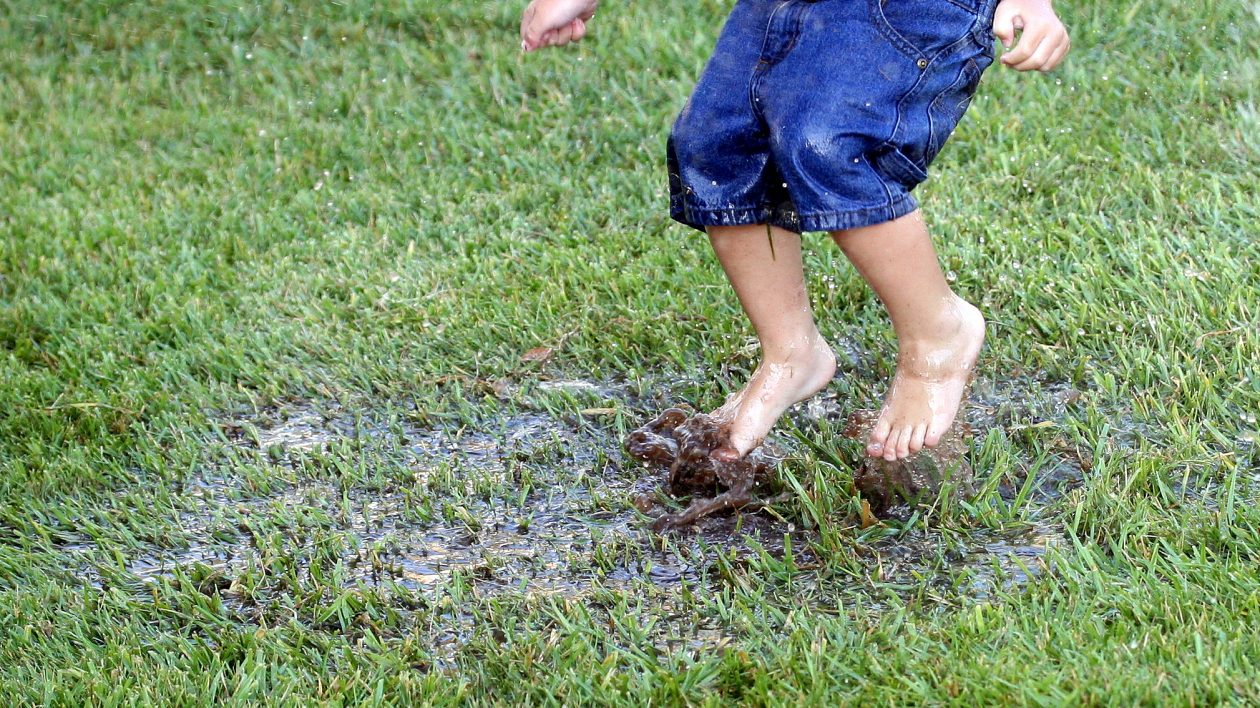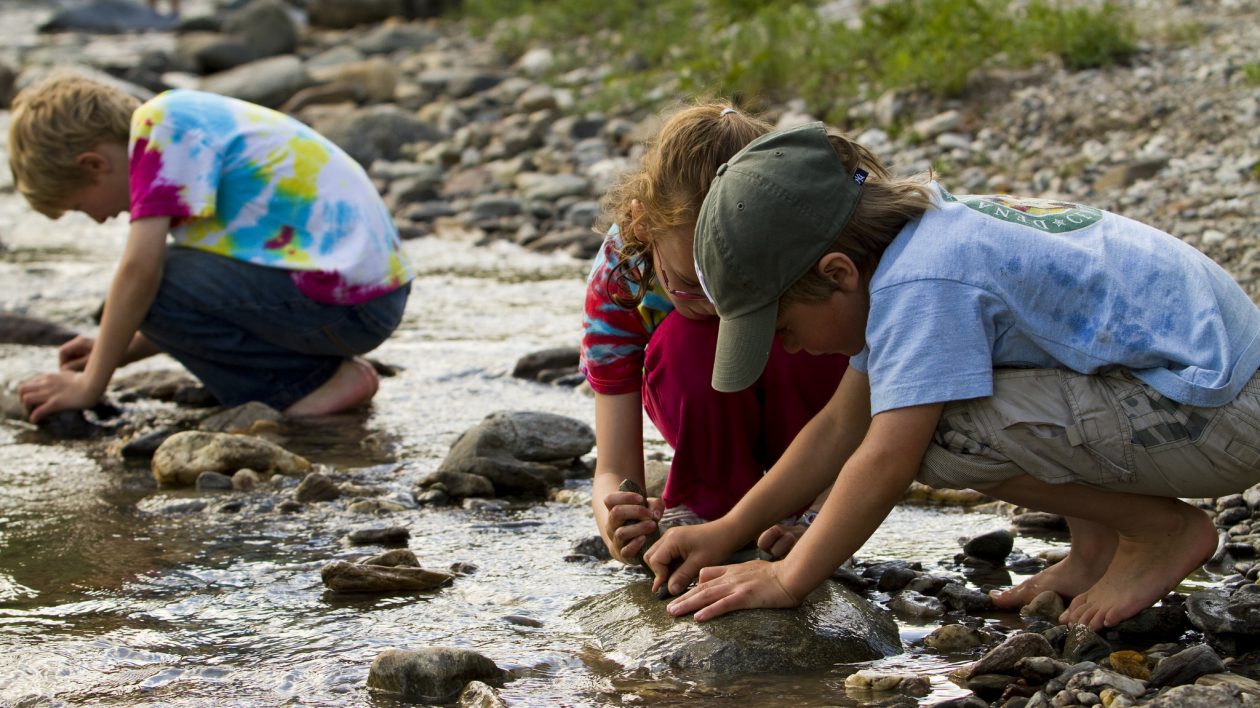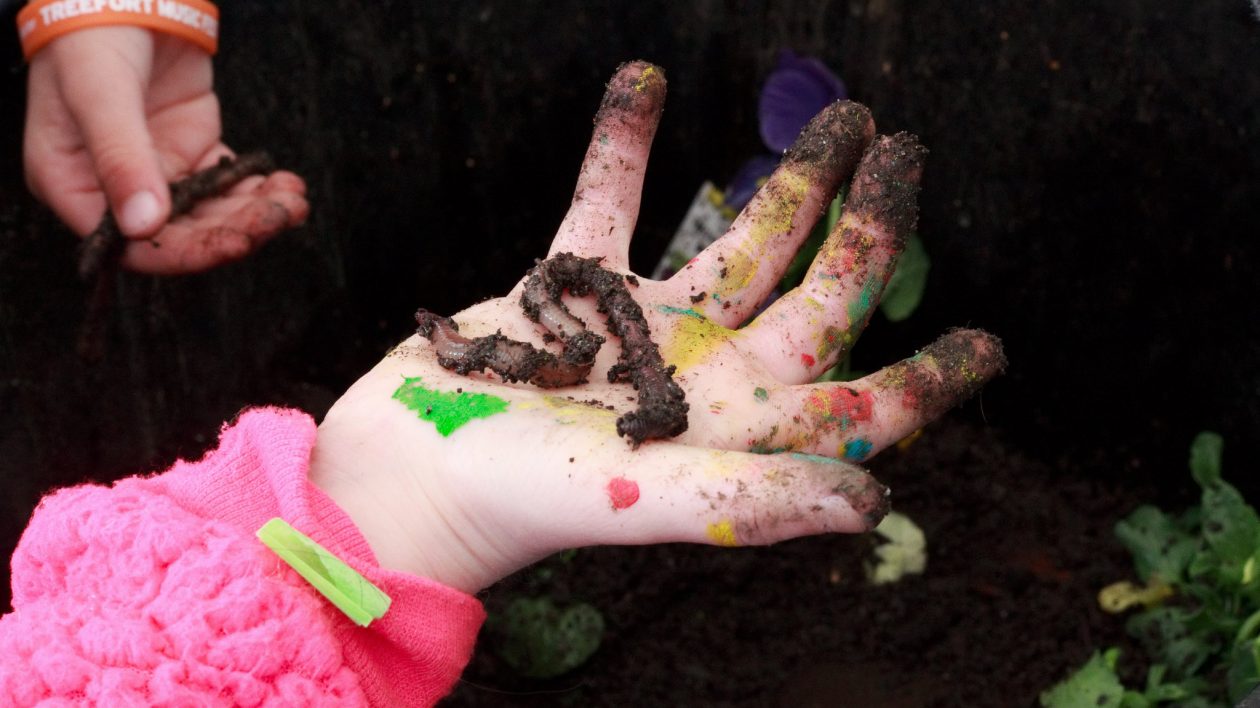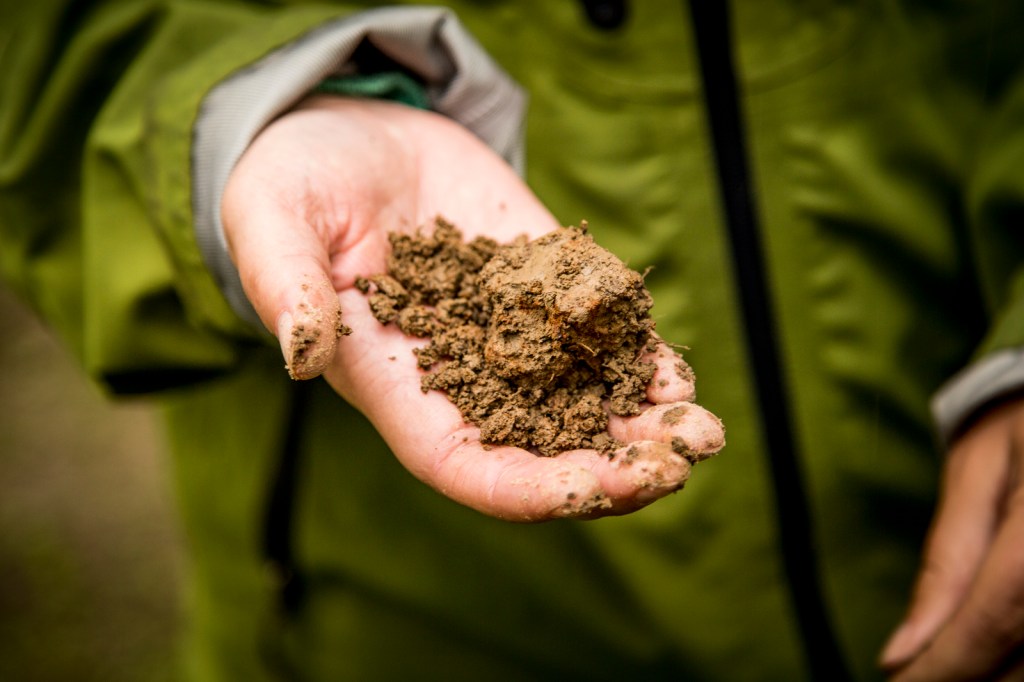The first time I took my infant daughter camping, I was ready to fulfill my vow to be the mom who let her kid happily coat herself in dirt. But as I scanned the ground holding a crawling, slobbering baby, all I saw was goose poop. So much goose poop.
I drew the line. I wasn’t a germaphobe, but I also wasn’t going to let her put her hands – which would inevitably enter her mouth – on bird feces. Or any feces, for that matter.
As a parent in an era where half of my news feed cautions of the perils of living in an overly sanitized world and the other half highlights the dangers of flesh-eating bacteria, just how much exposure to soil are we supposed to give our children?
Plenty, according to most new research. But use some common sense.
The Value of Dirt
Humans evolved in caves and fields – not in sanitized homes, cars and schools. And our immune systems developed to find and suppress foreign invaders, growing stronger with each battle won.
It’s why exposing those immune systems to the environment is so critical, says Jack Gilbert, co-author of Dirt is Good: The Advantage of Germs for Your Child’s Developing Immune System.
Gilbert is also a professor of surgery and the director of the Microbiome Center at the University of Chicago. His book, co-authored with Rob Knight (the director of the Center for Microbiome Innovation at the University of California, San Diego), was written not as an anecdotal memoir for why kids should play outside, but an easy-to-read, scientific, question-and-answer session about bacteria, microbiomes and over-sanitization.
“My colleagues wanted to reduce the uncertainty that parents have when they’re doing these kinds of things early in life,” he says.
“We wanted to put a book together that had all of the information from experts – us — that can hopefully be trusted,” he says. “We don’t have an agenda. We’re not trying to sell anything. It seems like a good time to put a book together and help them make appropriate decisions based on actual evidence.”
The basic advice, as the book’s title suggests, is that humans need to be exposed to soil, dust, bacteria or germs, whatever you wish to call them, to become healthy, happy adults.

The Dangers of Keeping Kids Clean
Take, for example, a 2001 study out of Europe. Researchers surveyed thousands of parents of children 6 to 13 years old in rural areas of Austria, Germany and Switzerland. Farming and non-farming families answered questions about asthma, hay fever and atopic eczema and many gave blood samples to measure antibodies to common allergies.
The results were pretty clear: Kids exposed to stables from birth to 5 had the lowest frequency of asthma, hay fever and atopic sensitization (skin allergies or eczema).
“Keeping your kids too clean and away from healthy dirt and healthy animals seems to be a problem that triggers a wide range of immune-involved diseases not generally encountered among babies growing up in third-world villages,” reads an excerpt from Gilbert’s book.
“Of course, these children suffer from other problems: limited access to healthcare and often extremely high rates of maternal and child mortality. So scientists are trying to figure out a happy medium between excellent healthcare and lifestyle choices, which could influence whether you develop chronic diseases such as autoimmune conditions.”
A U.S. study funded largely by the National Institutes of Health looked at the differences between Amish children – who are exposed to farms from a very young age – and Hutterite children – who are kept separated from the farm. About 5 percent of Amish children had asthma and about 7 percent had allergies. In the Hutterite children, about 21 percent had asthma and 33 percent had allergies, despite similar genetic backgrounds in the two groups.
“The central premise is our bodies have evolved to interact with the natural environment. If our body doesn’t get exposed, things can go wrong. It can become over responsive in not a good way. It’s a way of thinking about what they will be exposed to and making sure they get the kind of exposure early in life,” Gilbert says.
So when should you start exposing your kids to dogs, farm animals and other natural, environmental elements?
“When they’re born.”

At The Very Least, Don’t Over-Sanitize
Martin Blaser, director of the Human Microbiome Program at New York University, doesn’t put as much stock in exposing kids to dirt to build their immune systems.
But “dirt,” at least dirt that doesn’t contain feces or dog pee, for example, also won’t do any harm. And real harm can come from the country’s love-affair with antibiotics.
“I’m not against dirt, and believe me, I’m not a germaphobe,” says Blaser, who wrote the book Missing Microbes: How the Overuse of Antibiotics is Fueling Our Modern Plagues.
“I am against the over use of hand sanitizers, for sure,” he continues. “I think the most important microbes are the ones we evolved with, we humans evolved with, that you got from your mother, and she got from her mother all through time and you’ve given to your children. Those are the really important ones and my concern is we are losing them.”
Exposure to dirt – be it dust, germs or other natural elements – may play a role, but it’s “the shorter end of the stick.”
“Play in dirt, have fun… I think the health benefit may not be as much as some people think,” he says.
It’s a difference in emphasis, says Gilbert, who frequently collaborates with Blaser. All things being equal – meaning, assuming there is not incredible overuse of antibiotics – microbial exposure matters.
“We have an overwhelming body of evidence that under certain circumstances it can be beneficial. If you brought up a child in a very sterile environment, their immune systems are more likely to develop in a way different to what we would consider to be appropriate for robust human health,” Gilbert says.

Don’t Sweat the Small Stuff
Do flesh-eating bacteria exist? Yes.
Do dangerous parasites exist? Yes.
But instead of functioning off of emotion, use some probabilities to guide your parenting. The chance of dying by falling in the U.S. in 2016 was one in 119, according to the National Safety Council. In comparison, the probability of dying by being struck by lightning was one in 114,195 and the chance of dying by flesh-eating bacteria, well, it didn’t make the list.
What is the chance of something bad happening if we live in an overly sanitized world where we’ve isolated the body from any microbial exposure?
We can’t know for sure, Gilbert says, but likely quite high.
“We’ve never said there aren’t dangers in this world. You have to be careful… Most people want written rules and guidelines about what they can and cannot do. Don’t be stupid, think about what is going on, but let’s not go overboard,” he says.
So let them play in the dirt. If their hands end up in their mouths, or some of the dirt ends up in their mouths, keep an eye on them. If they develop a rash or fever, take them to a doctor. If they don’t, they’re probably fine.
“Take them for walks in the woods… Take them to park. You can buy them a dog that will interact with them. Let them lick their faces,” he says.
Should they eat cat poop or raw chicken? No. Should they play with rotting carcasses? No. Should I have let my 6-month-old daughter crawl in a field of goose droppings? No. And I didn’t.
But this summer and fall, when we spent most weekends camping in forests across the West, she was routinely covered in dirt and dust, washed off most often when she played in our dog’s water bowl.
I cringed a little, and then cleaned her hands before dinner.




I grew up as a curious, free-roaming, little boy at the edge of a great forest. A mob of cousins, and neighbors made this our school, and it absorbed all of our attention. I have been healthy and happy for 78 years, I worked with scientists for so long that I am considered a scientist (natural scientist second, and mathematician first). I just retired as a full professor of mathematics from USF. Freedom builds curiosity, the need to understand, and healthy, strong and happy intellects. Our children should be given as much of it as they can handle. Professor WRichard Stark, Tampa.
While I subscribe to the fact that children’s immune systems need to be made to work from infancy on in order to build natural resistance I will offer this anecdote:
As a young Mom and Biochemist I was adamant that my infant Son develop his immune system naturally. So, as he crawled about inspecting everything including via his mouth, I monitored to be sure he avoided scat or other highly disease potential items.
Little did I know that a stick he found and was delightfully chewing on would give him amoebic dysentery. At 6 months he nearly died due to severe dehydration caused by vomiting and diarrhea. Quick medical intervention as well as my knowledge as to how easily infant dehydration can kill saved his life. But, from then on I was much more selective about what went into his mouth.
As a newer mom of a crawling baby, I wanted to prepare myself for the upcoming spring and summer months. This was well written and encouraging. Reminding myself to use my common sense and mom instincts. And let me kid enjoy nature and explore the world.
Hey,, first of all it’s not ‘dirt’, it’s soil. Please correct it. You are disrespecting it. Dirt is trash na?
I know with my first, I was a harpy about germs. By the the time # 5 arrived , I was way more relaxed and reasonable. I do think kids need a little dirt, tempting fate though-not so much.
As any gardener knows, dirt is good stuff–on many levels!
While I was growing up in a rural farming area of the Midwest, my Mom would quote a saying she’d learned from her Mother, that ‘You have to eat a peck of dirt in your lifetime’ , a peck being a measure equal to 1/8 bushel. She grew up on a farm and had lots of contact with the garden, fields & woods around her growing up.
She let us play outside, in fact she insisted on it. The rule for our Summer outdoor play was that we had to wash our face, feet & hands at the outside water faucet before we came indoors, getting most of the loose dirt off. That was many decades ago & other than the occasional sunburn & some bad bouts with poison ivy, that playing outdoors in the garden & forest dirt hasn’t hurt me any. Yes, there are harmful organisms outdoors, one of my relatives caught a harmful fungal infection from soil and I’ve suffered from poison ivy. But I’ve also been in car accidents where I’ve gotten hurt when there was nothing but pavement all around.
There is some level of danger everywhere, but both cars and gardens bring us a myriad of opportunities to balance the dangers. Use normal cautions against the dangers and enjoy the beauties of the out of doors!
Great! This summer my grandkids came home every day all grimy from playing at camp. You know, the kind of grime that gets under your socks and turns your ankles grime-colored. I used to have ankles like that! They were happy, and so was I. Getting dirty makes us humans happy!
I grew up in Colorado and frequently ran around barefoot in green grass, drank water from the hose and gutter water, and played in dirt!! Family spent a lot of time in the mountains, as my dad went fishing and couldn’t wait to splash in a cold river. Believe me, I not only got sick less often as a child/teen, I rarely get sick today as an adult. Let them play and have fun.
I grew up making mud pies (not eating them!), climbing in the big mulberry tree that stood over our sand pile (and eating the mulberries!) Dad would have another big truck of sand from his brother’s gravel pit brought in every few years – once we kids had stomped the last pile flat into the ground. It was his way of keeping us close to home when we were little-
Mom kept a fruit orchard so she could make jellies & pies, and we were not scolded for sneaking snacks, ever, from either the apple trees and grape vines, OR from the huge garden she tended to help feed her flock of eight kids. Of course we never wasted or trampled… She also raised chickens for Sunday dinners.
These are some of my very best and favorite memories and I am still very healthy today at 72 because of this great start in life… I never caught a cold or needed an aspirin until I was years gone from there. Antibiotics?- that’s for other people.
So glad to have this info. I go crazy when my sister insists that her grandkids NOT get dirty and incessantly requests they wash their hands, stay off the dirt, keep clean. Wish I could forward this article without insulting her, which this would, sadly Great and fun article, thanks
I grew up on Maui in the Hawaiian Islands. I can remember throughout my childhood eating dirt. I can still remember the taste. It was good. I am now 94 years old and still doing my own work. I’m not saying it is because of eating dirt but at least it didn’t lead to an early decline.
Also-in those days we didn’t have chemical laced dirt as we do now. I’m not so sure I would willingly indulge today.
Thank you for your information. Mary Louise O’Brien
The old adage is “Everyone needs their peck of dirt”. There is truth to this. Get out in nature.
Great advice ! Do not sweat the small stuff. Chemical sanitizers (chlorine based,etc) can also create problems despite marketing.
Definitely be cautious with antibiotic medication and do not insist with your physician !
As any gardener knows, dirt is good stuff–on many levels!